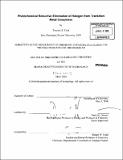Photochemical reductive elimination of halogen from transition metal complexes
Author(s)
Cook, Timothy R. (Timothy Raymond), 1982-
DownloadFull printable version (20.35Mb)
Other Contributors
Massachusetts Institute of Technology. Dept. of Chemistry.
Advisor
Daniel G. Nocera.
Terms of use
Metadata
Show full item recordAbstract
This thesis is focused on the synthesis and study of transition metal complexes that undergo halogen elimination when irradiated with UV and visible light. This chemistry is relevant for solar energy storage schemes in which simple substrates such as HX (X = Cl, Br, OH) can be split to H2 and X2 in thermodynamically uphill photocycles. The activation of strong M-X bonds is a key requirement for efficient photocatalysts and represents the most challenging step of HX splitting schemes. Studies have focused on the design and characterization of late-metal phosphine complexes with an emphasis on chemical oxidation with halogen to give stable, halide-rich metal centers, and the subsequent photochemistry of the resulting complexes. The primary goal of this work was to increase the photo-efficiency of M-X bond activation as (1) the low quantum yield of halogen elimination had been implicated as the governing step determining the efficiency of previously reported HX splitting catalysts and (2) mechanistic studies on the nature of halogen elimination using laser kinetic techniques require a substantial concentration of transient photointermediates for signal to be observed. These targets spurred the development of a number of late-metal homo- and heterobimetallic complexes which undergo highly efficient halogen elimination, as well as the first reports of authentic X2 reductive elimination from a transition metal center and direct observation of M-X bond activation using transient absorption spectroscopy.
Description
Thesis (Ph. D.)--Massachusetts Institute of Technology, Dept. of Chemistry, 2010. Vita. Cataloged from PDF version of thesis. Includes bibliographical references.
Date issued
2010Department
Massachusetts Institute of Technology. Department of ChemistryPublisher
Massachusetts Institute of Technology
Keywords
Chemistry.